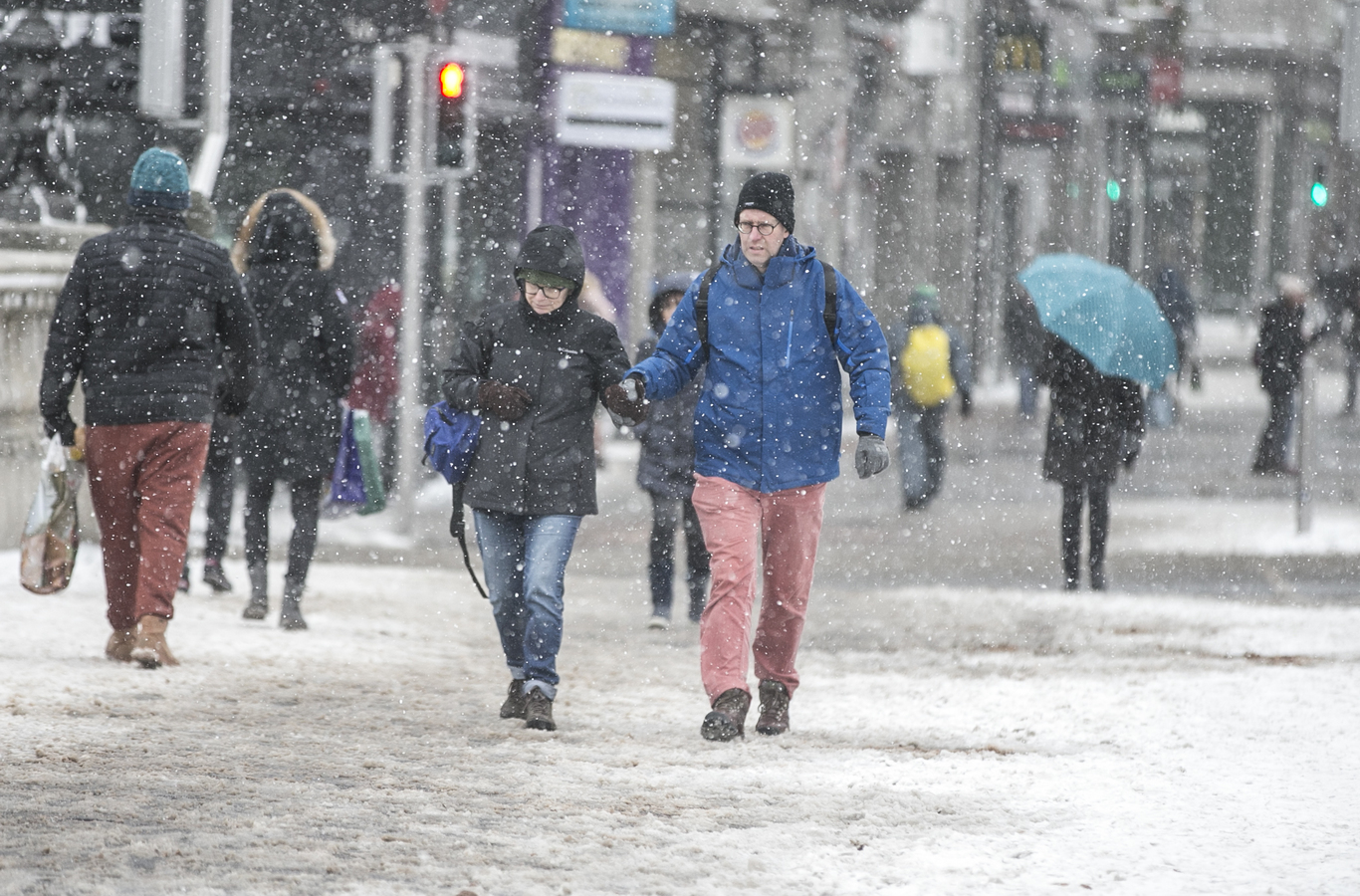'It would be a cop-out': Businesses reject calls for forced closures during red alerts
A proposed bill would make it mandatory for employers to shut workplaces in extreme weather.
BUSINESS GROUPS SAY it shouldn’t be essential for workplaces to close during a time of a red alert weather warning despite advice this week urging people to stay indoors.
Before the storm hit the country, Taoiseach Leo Varadkar said that people should heed warnings given by authorities, while minister Eoghan Murphy said that the “onus is on the employer to put the safety of staff at the forefront”.
The Taoiseach also said, however, that employers should make their own choice on the matter and that a “blanket instruction” on all businesses to close would be inappropriate.
A proposed Sinn Féin bill would make it compulsory for employers to close places of business during a red alert – and not penalise employees on those days – but it has not received government support.
What is a red alert?
A Met Éireann red alert is one which advises people to take action. Here is its definition:
“The issue of red level severe weather warnings should be a comparatively rare event and implies that recipients take action to protect themselves and/or their properties; this could be by moving their families out of the danger zone temporarily; by staying indoors; or by other specific actions aimed at mitigating the effects of the weather conditions.”
Prior to this week’s nationwide red alert, the previous similar alert issued was during Storm Ophelia in October 2017, when three people died.
Authorities were abundantly clear in their advice ahead of the worst of the storm this week.
Varadkar warned in a public address that in a blizzard scenario it could be “total wipeout” outdoors and that between 4pm on Thursday and 12 noon on Friday the country is on “red alert”.
National Emergency Coordination Group chair Sean Hogan was even more unequivocal. He said on Wednesday: “Do not be out there from 4pm tomorrow. This is like Ophelia, it is a different type of safety concern but it is a safety concern.
“If people need to travel they need to consider how they will be home safely by 4pm tomorrow.”
He said employers will need to consider whether it will be safe to ask employees to come to work over the coming days.
“We’re hoping the damage won’t be like what it was with Ophelia but we are in uncertain territory here.”
He said that if people are out and about in the weather on Thursday and Friday they might get disoriented and lost. He noted there were a number of deaths of people outdoors in 2010.
Sinn Féin wants this kind of advice in a red alert warning formalised in legislation.
Under the bill, an employer would be required in red alert conditions to close workplaces “and make reasonable measures to inform all employees to stay away from it for the duration of that warning”.
Another provision was to “ensure that an employee who stays away from such place of work for the duration of a status red severe weather warning is not penalised because of such action”.
Sinn Féin Imelda Munster TD said: “This bill will provide for the safety of employees during certain severe weather warnings. It will enhance public safety and ensure the safety of rescue service personnel during such a weather warning.”
She said there was “a significant level of confusion” during Storm Ophelia regarding the actions private-sector businesses should take.
Disagreement
Business groups, however, think that the blanket measures would go too far.
While groups such as Ibec and ISME urged employers to heed the government’s warnings and treat the safety of their staff with the utmost seriousness, some feel a blanket ban on businesses opening during such a weather event goes too far.
Graeme McQueen, head of public affairs at Dublin Chamber, said that businesses by and large heeded the advice and took sensible measures given the weather conditions.
He said: “Ultimately it’s up to the individual business in terms of what they decide to do. However, the warnings that have been issued by the various authorities are clear and should be adhered to.
“The view of Dublin Chamber remains that people come first in this situation. Given the seriousness of the weather warnings, we would encourage employers to look after their staff – particularly given the lack of public transport available.
“For the most part, common sense has prevailed, with a lot of companies allowing staff to work from home.”
ISME CEO Neil McDonnell said that any proposals to enforce the closure of businesses in such events was unworkable.
He said: “We don’t believe it would be appropriate to order businesses to shut when there is a red alert warning.
“Who would be responsible for deciding which businesses to shut, and which to leave open? Many ‘non-essential’ workplaces are really important to our daily lives.
“Bakers, convenience stores, forecourts, HSE outworkers, man-in-van services, utilities services; all of these become ‘essential’ when we need them. Invoking some law to direct the shutdown of everything would simply be a cop-out.”
McDonnell added that workers are already protected under the Safety Health and Welfare at Work Act.
Written by Sean Murray and posted on TheJournal.ie






